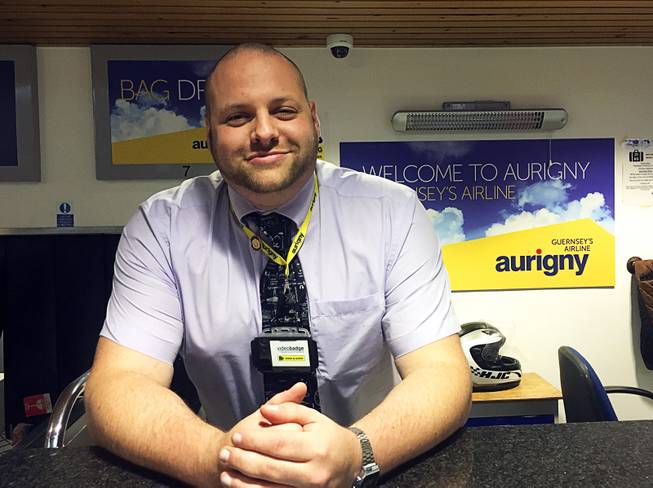
Edesix Ltd. via The New York Times / AP
A handout photo of Dave Cox, the ground operations manager at Aurigny, a small airline in Guernsey, wearing a camera made by Edesix Ltd. After cellphone videos began to emerge of clashes between passengers and airline employees, some companies are trying to protect their workers by arming them with their own cameras.
Friday, Nov. 24, 2017 | 2 a.m.
Richie McBride is chief executive of Edesix Ltd., a company that produces small wearable cameras used by railway, health care and retail workers in Europe. Lately, he has turned his attention to a new and potentially sizable market: airlines.
Already, McBride has sold the devices to Aurigny, a small carrier in Guernsey serving Britain, the Channel Islands and France. Managers of employees who interact with customers can set off the lapel-mounted camera when they think an event is getting out of hand.
“As a small community airline, a vast majority of our passengers are very friendly, polite, respectful, and often know our staff personally,” said Dave Cox, the ground operations manager for Aurigny. “However, like with all carriers, you may occasionally encounter individuals who can be rude, aggressive and abusive to our staff.”
Aurigny may be the first airline to arm its workers with cameras, but it is not likely to be the last, McBride said.
“This is bleeding-edge, everyday technology,” he said, adding how useful the gate and flight crews’ perspective could have been in some of the highly publicized clashes between air travelers and airline staff members.
“Why should it just be that the passenger is the one who is recording everything on their cellphone and editing it the way they see fit?” he said. “The crew has no way of documenting what they went through to get to the very explosive situation.”
McBride envisions a not-too-distant-future in which a flight attendant wearing a camera would notify a passenger and start the recording. Encrypted audio and video would then be uploaded to a secure cloud-based server.
The employee cannot view or alter the recording, he said.
Still, it is a far cry from the days when airlines competed based on how much they coddled their
American Airlines, which was featured in a YouTube video of a mother and flight attendant arguing over a stroller in April, has no plans to use body cameras. There, the message to employees is to de-escalate conflicts.
A memo the airline’s chief executive sent to employees after the stroller incident told them to take a moment to breathe, and ask for help. “A service interruption we can handle, but it is much harder to explain viral video content that is inconsistent with the first-class service you all have made American known for.”
Videos of confrontations between airline workers and passengers have occasionally resulted in financial settlements, as when United pulled David Dao, a Louisville, Kentucky, physician, off an airplane so they could use his seat for an airline employee. (United says it is not considering equipping its crews with body cameras.) But the case has encouraged other air travelers to threaten staff members with their cellphones.
“People are putting their phone up, saying, ‘You better book me on the next flight.’ They’re trained to intimidate our crew members using their phone,” said Ross Feinstein, a spokesman for American.
At the Association of Professional Flight Attendants, a union that represents nearly 27,000 workers at American Airlines, the national president, Bob Ross, said airlines needed to protect the privacy and security of flight attendants by enforcing policies limiting what passengers can photograph.
“I’m asking flight attendants to take their full names off their uniforms,” Ross said, adding that the union would ask the airline to provide name tags with just a first name or a name of the flight attendant’s choosing.
“Passengers are putting their names on social media and private-messaging them and harassing them over the fact that they lost their luggage or a flight was delayed,” he said. “These are real threats that have just gone out of proportion over the past year, and how do you stop it?”
Flight attendants at American and elsewhere are threatening to make their own videos to level the field.
“We have had the topic come up after the Dr. Dao event,” said Taylor Garland of the Association of Flight Attendants, which represents workers at 19 airlines. “There is much to consider on the issue,” she said in an email statement later. “Any change to conditions in the cabin requires careful consideration.”
While airlines and passengers embrace the opportunities presented in the digital era, the elevation of the camera wars makes it clear that new technology can have unanticipated consequences that will be difficult to address.
